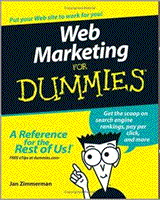 Since the purpose of having a website is for people to find you online, I wanted to go over some basic strategies for ensuring that people searching for your types of services/products find your small business’s website.
Since the purpose of having a website is for people to find you online, I wanted to go over some basic strategies for ensuring that people searching for your types of services/products find your small business’s website.
The goal of optimization is to have your website listed before your competitors ("ranked highly") (ideally on the first page of search results, which most people don’t look beyond).
Most search engines report the result of searches in two groups: sponsored ads and normal ("organic ") searches. Sponsored ads appear because the company has agreed to pay the search engine (via a pay-per-click [PPC] ad campaign) money whenever people click on their ad for specific keywords. PPC is a great way to generate traffic quickly, but it’s often not cost effective long-term. Long-term you want your website to appear organically highly ranked.
When a person does a search, the goal of the search engine is to show the most relevant websites that likely match the person’s search terms . The goal of optimizing is to make your site highly relevant for specific search terms.
- Identify the search terms you want to rank highly for . As in all forms of marketing, you need to think like the person who’s looking, not as the business who’s selling. That means you need to know what keywords people use to search for businesses like yours. This information is easy to find from pay-per-click programs, such as Google Ad Words Keyword Tool . Don’t forget to also spot trends (using a tool such as Google Trends ) in keyword searches, since you want to catch "up-and-coming" searches that might be ranked low now.
- Use the keywords in relevant pages in your website . Keywords are seen in: the main body of the web page, meta tags (less important, but still worth having), and the alt-text in your images. Use keywords naturally – remember the point is to have more customers. If your website isn’t human-readable, then all your work will be for naught. Also, make sure that if you want to target customers in a region, you use your region in your keyword phrases.
- Get links to your website. Search engines rank websites by their "authority ". One way they measure authority is how many (and which) other websites link to them ("backlinks "). One backlink from an top-class website is worth hundreds of poor-quality links. You can get backlinks from a wide variety of sites: organizations that you’re a member of, blogs, and directories. One tool I recommend is Directory Submitter , a free tool to get backlinks. Be warned: Google is in the process of penalizing websites with paid backlinks. Also: submit your websites to the search engines (if you have not already) so they can explicitly add your site to their directories: Google , Yahoo , and MSN .
There is a lot more to search engine optimation (SEO) that these tips. Don’t forget there are professionals that can help you with your search engine optimization (I’d be happy to recommend some).
 People make a split-second judgment of your website. Is it “talking to them?” Is it worth their time to continue reading it? Are you getting the traffic you want? Are visitors converting to customers?
People make a split-second judgment of your website. Is it “talking to them?” Is it worth their time to continue reading it? Are you getting the traffic you want? Are visitors converting to customers?